Sesshu Foster's Blog, page 3
April 5, 2016
For Thuy
People bunched outside of the chapel doors, SRO, trying to peer inside. Ribbons fluttered in the breeze, wide long ribbons from wreaths strung with their black phrases in English and Vietnamese. Wreaths and flowers lined the interior to the doors. One from an ER staff—I presumed—someone’s co-workers.
Incense at an alter, gilt packets, a large floral centerpiece around her photograph, and at one side, a small Buddha. Behind it, a tapestry of the Buddha. I had no view because of the press of people.
Leaves on a green lawn under big trees. Traffic on Main Street kitty corner from Ranch 99 Market. The minister spoke in Vietnamese. Men ducked in and out, whispering. She appeared to me, this girl, bearing up under the significant duress, of her time and ours, with an inward steeliness, an outward coldness.
As if begrudging words, sometimes she’d say goodbye. I thought it was mere shyness. She was lithe and strong, a distance runner. Sometimes I heard the goodbye. I looked up as she went to the door—the abrupt profile of her cheek so expressed the fierce determination that I admired and respected.
17 years old, swept out by a wave on the beach and drowned last Saturday, as if the world insisted on making the cruelest, most bitter gesture in the most obvious vacant way. Her friends wept as they spoke of their love for her. I waited my turn to speak. “Thank you for the honor of letting us know Thuy Tran,” I said, “thank you for the honor of allowing me to be her teacher.”
I clasped the hands of her brother, her sister and her mother, on the way out the side door. I said something to them. Her mother thanked me. Out in the sunshine, my cell phone chirped. Messages ticked into my cell phone, wishing me happy birthday.



March 28, 2016
Avenue 50 and Write Large Press presents literary L.A. week
LOS ÁNGELES

Writ Large Press presents
THE INSTANT
Monday March 28 • 8pm
Ham & Eggs Tavern
433 West 8th Street • Los Ángeles
FREE
A monthly reading series that serves up local and visiting literary contributors, unique live music/performance and everyone’s favorite go-to food in a cup, Instant Ramen.
Episode 2 featuring noted poets & writers:
Vickie Vertiz
Jervey Tervalon
Jade Chang
Jesse Bliss
&
Toni Ann Johnson
and a live music intermission by:
Runson Willis III
and a trio of top notch instant ramen available on site.
We call this, The Instant.
more info

Avenue 50 Studio presents
ASKEW POETRY JOURNAL
the reading
Tuesday March 29 • 7pm
Avenue 50 Studio
131 N. Avenue 50 • Highland Park
$5 Suggested Donation
featuring many poets published in Askew over the years.
Angel Garcia / Amy Uyematsu / Kim Young / Fernando Salinas / Suzanne Lummis / Lynne Thompson / Patty Seyburn / Phoebe Ozuna / Jerry Garcia / Elisabeth Adwin Edwards / Cece Peri / Alexis Rhone Fancher
hosted by MARSHA DE LA O, FRIDAY GRETCHEN & the Ventura County Poet Laureate, PHIL TAGGART
more info

Writ Large Press presents
ALWAYS IN TRANSLATION
TRANS PACIFIC POETRY & PROSE
Wednesday March 30 • 8pm
Document Coffee Bar
3850 Wilshire Blvd #107 • Los Ángeles
Free
Kim Kyung Ju (trans. Jake Levine) / Kim Yi-Deum (trans. Jiyoon Lee) / Chiwan Choi / Eunsong Kim / Janice Lee / Hannah Sanghee Park
more info

The Advisory Circle of Con Tinta
(a collective of Chicana/Latina Activist Writers), Poets Responding to SB 1070, and Avenue 50 Studio invite you to
LA PACHANGA 2016!!!
award ceremony & celebration
Thursday March 31 • 5:30pm
Avenue 50 Studio
131 N. Avenue 50 • Highland Park
FREE / donations welcome
Honoring the following
Chican@ and Latin@ writers:
Francisco X. Alarcón, RIP // Juan Felipe Herrera // Lucha Corpi
// Luis Javier Rodríguez // Odilia Galván Rodríguez
And celebrating the release of the new anthology Poetry of Resistance: Voices for Social Justice (University of Arizona Press), edited by Francisco X. Alarcón and Odilia Galván Rodríguez.
Reading for the evening:
JoAnn Anglin / Cathy Arellano / Victor Avila / Devreaux Baker / Esme Bernal / Sarah Browning / Xanath Caraza / Elizabeth Caresses / Lorna Dee Cervantes / Antoinette Nora Claypoole / Karen S Cordova / Iris De Anda / Sharon Elliott / Mario Angel Escobar / Odilia Galván Rodríguez / Nancy Aidé González / Claudia D. Hernández / Juan Felipe Herrera / Mark Lipman / John Martinez / Andrea Mauk / Gerardo Pacheco / Melinda Palacio / Matt Sedillo / Edith M. Vazquez / Edward Vidaurre / Andre Yang
w/ plenty of food & drinks & palabra!
& plenty of books for sale & signing! (this is an AWP off-site event)
more info
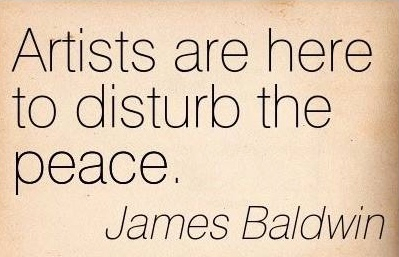
Against White Privilege:
Writers of Color, LGBTQ, and Disabled Writers
Respond to AWP
Thursday March 31 • 7pm
The Falls Lounge
626 S Spring Street • Los Ángeles
FREE
Jericho Brown // Ava Chin // Bao Phi // Teka Lark // Xavier Cavazos // Neelanjana Banerjee // Dan Vera // Taz Ahmed // Hieu Minh Nguyen // Orlando White // Regie Cabico // Armine Iknadossian // Arash Sardinia // Linda Rodriguez
(this is an AWP off-site event)
more info

FREE & ALL ARE WELCOME: PUBLIC POOL is diving into existence and we want you to join us and celebrate! In addition to a group of amazing readers, we’ll have a DJ dropping dope beats, beer and wine bar and other refeshments, and free poetry broadside giveaways!
more info

Two Dollar Radio/CCM/Entropy/Action Books/Writ Large
#AWP16 READING
Friday April 1 • 8pm
These Days Gallery
118 Winston Place • Los Ángeles
FREE
a night of literary readings, booze, socially awkward mingling, shenanigans, metal, metal, and, oh yeah, a raffle!
Mark de Silva, Colin Winnette, Janice Lee, Sean H. Doyle, Dolan Morgan, Ashley Farmer, Alexandra Naughton, Johannes Göransson, Don Mee Choi, Yideum Kim, Valerie Mejer, Wendy C. Ortiz, Rachel McLeod Kaminer, Traci Akemi Kato-kiriyama, Ashaki M. Jackson, and more.
(this is an AWP off-site event, like no other)
more info
Writ Large Press presents
AWP Off Site
VONA/Voices and Willow Books Authors Read
Saturday April 2 • 7pm – 10pm
The Falls Lounge
626 S Spring Street • Los Ángeles
FREE
Writers-of-Color–More Urgent Now Than Ever
Faculty Authors from VONA-Voices
Elmer Abinader // Faith Adiele // Tananarive Due // M. Evelina Galang // David Mura // Daniel José Older // Willie Perdomo
Diem Jones, Hosts
Willow Books Authors
Yesenia Montilla // Cedric Tillman // Cole Lavalais // Mahogany Browne // Rachelle Escamilla // Reginald Flood // Randall Horton
(this is an AWP off-site event, like no other)
more info

The Rejected:
Panels Not Approved by AWP
Friday April 1 3pm to Saturday April 2 5pm
Cielo Gallery & Studio
3201 Maple Ave • Los Ángeles
FREE
Come and experience many of the panels that were rejected by stupid ass AWP16 for no damn good reason. These will be awesome panels.
Brought to you by Lauren Traetto, Writ Large Press, and CIELO.
In beautiful South Central LA.
Please also attend and support our sister event, Not Your Average White Poets, put on Wednesday night by the people of As/Us Journal, along with Medford Street Studios and Xicanxcritores of East Los/Boyle Heights: https://www.facebook.com/events/1128476133852149/
MORE DETAILS AT LINK BELOW!
more info


March 12, 2016
Juan Felipe Herrera in conversation with Sesshu Foster, April 9

L.A. TIMES FESTIVAL OF BOOKS AT THE UNIVERSITY OF SOUTHERN CALIFORNIA
http://events.latimes.com/festivalofbooks/tickets-and-schedule/schedule/
Seeley G. Mudd (SGM 123)Ticket required; Signing Area 4
11:30 a.m.
SATURDAY, APRIL 9, 2016
SEELEY G. MUDD (SGM 123)
Juan Felipe Herrera in conversation with Sesshu Foster
(Conversation 1092)
Interviewer: Sesshu Foster
Juan Felipe Herrera
Juan Felipe will also be reading at the festival’s Poetry Stage at 2:30 PM
Indoor Conversations require free tickets.
There are two ways to get Conversation tickets:
Online
Advance Conversation tickets will be available from the website starting April 3, 9 a.m. A $1 service fee applies to each ticket. See http://events.latimes.com/festivalofb...
At the festival
A limited number of tickets for each Conversation is distributed at the festival ticketing booth on the day of the Conversation — free of service charges. The booth will open at 9 a.m. each day.
Guests with Conversation tickets must arrive 10 minutes before the scheduled Conversation start time to ensure seating.
a poem by Juan Felipe:
latest book:
http://www.citylights.com/book/?GCOI=87286100437770&fa=author&person_id=4859

Blood on the Wheel
Ezekiel saw the wheel,
way up in the middle of the air.
TRADITIONAL GOSPEL SONG
Blood on the night soil man en route to the country prison
Blood on the sullen chair, the one that holds you with its pleasure
Blood inside the quartz, the beauty watch, the eye of the guard
Blood on the slope of names & the tattoos hidden
Blood on the Virgin, behind the veils,
Behind—in the moon angel’s gold oracle hair
What blood is this, is it the blood of the worker rat?
Is it the blood of the clone governor, the city maid?
Why does it course in s’s & z’s?
Blood on the couch, made for viewing automobiles & face cream
Blood on the pin, this one going through you without any pain
Blood on the screen, the green torso queen of slavering hearts
Blood on the grandmother’s wish, her tawdry stick of Texas
Blood on the daughter’s breast who sews roses
Blood on the father, does anyone remember him, bluish?
Blood from a kitchen fresco, in thick amber strokes
Blood from the baby’s right ear, from his ochre nose
What blood is this?
Blood on the fender, in the sender’s shoe, in his liquor sack
Blood on the street, call it Milagro Boulevard, Mercy Lanes #9
Blood on the alien, in the alligator jacket teen boy Juan
There is blood, there, he says
Blood here too, down here, she says
Only blood, the Blood Mother sings
Blood driving miniature American queens stamped into rage
Blood driving rappers in Mercedes blackened & whitened in news
Blood driving the snare-eyed professor searching for her panties
Blood driving the championship husband bent in Extreme Unction
Blood of the orphan weasel in heat, the Calvinist farmer in wheat
Blood of the lettuce rebellion on the rise, the cannery worker’s prize
Blood of the painted donkey forced into prostitute zebra,
Blood of the Tijuana tourist finally awake & forced into pimp sleep again
It is blood time, Sir Terminator says,
It is blood time, Sir Simpson winks,
It is blood time, Sir McVeigh weighs.
Her nuclear blood watch soaked, will it dry?
His whitish blood ring smoked, will it foam?
My groin blood leather roped, will it marry?
My wife’s peasant blood spoked, will it ride again?
Blood in the tin, in the coffee bean, in the maquila oración
Blood in the language, in the wise text of the market sausage
Blood in the border web, the penal colony shed, in the bilingual yard
Crow blood blues perched on nothingness again
fly over my field, yellow-green & opal
Dog blood crawl & swish through my sheets
Who will eat this speckled corn?
Who shall be born on this Wednesday war bed?
Blood in the acid theater, again, in the box office smash hit
Blood in the Corvette tank, in the crack talk crank below
Blood boat Navy blood glove Army ventricle Marines
in the cookie sex jar, camouflaged rape whalers
Roam & rumble, investigate my Mexican hoodlum blood
Tiny blood behind my Cuban ear, wine colored & hushed
Tiny blood in the death row tool, in the middle-aged corset
Tiny blood sampler, tiny blood, you hush up again, so tiny
Blood in the Groove Shopping Center,
In blue Appalachia river, in Detroit harness spleen
Blood in the Groove Virus machine,
In low ocean tide, in Iowa soy bean
Blood in the Groove Lynch mob orchestra,
South of Herzegovina, south, I said
Blood marching for the Immigration Patrol, prized & arrogant
Blood spawning in the dawn break of African Blood Tribes, grimacing
& multiple—multiple, I said
Blood on the Macho Hat, the one used for proper genuflections
Blood on the faithful knee, the one readied for erotic negation
Blood on the willing nerve terminal, the one open for suicide
Blood at the age of seventeen
Blood at the age of one, dumped in a Greyhound bus
Blood mute & autistic & cauterized & smuggled Mayan
& burned in border smelter tar
Could this be yours? Could this item belong to you?
Could this ticket be what you ordered, could it?
Blood on the wheel, blood on the reel
Bronze dead gold & diamond deep. Blood be fast.
Juan Felipe Herrera, “Blood on the Wheel” from Border-crosser with a Lamborghini Dream. Copyright © 1999 by Juan Felipe Herrera. Reprinted by permission of University of Arizona Press.
Source: Border-crosser with a Lamborghini Dream (University of Arizona Press, 1999)
from http://www.poetryfoundation.org/learn...


March 11, 2016
¡Mañana! ¡Tomorrow! Intercambio bilingüe @ Hammer / Bilingual Exchange @ Hammer — ¡& AntenaMóvil!
on / with Antena / Antena Los Ángeles
presents:
¡El AntenaMóvil ya está instalado! Ven a nuestro evento bilingüe este sábado no solamente para compartir comida rica y conversación rica, sino también para ver/leer/comprar libros de muchas editoriales pequeñas y micros de Latinoamérica y Estados Unidos — incluyendo las maravillas locales Kaya Press, Phoneme Media, Ricochet Editions, Seite Books, y Writ Large Press. El Antenamóvil es un triciclo de carga adaptado, equipado con libros que están a la venta y para leer aquí. La selección se enfoca en obras bilingües y multilingües, textos en traducción y textos innovadores de escritorxs de razas marginadas.
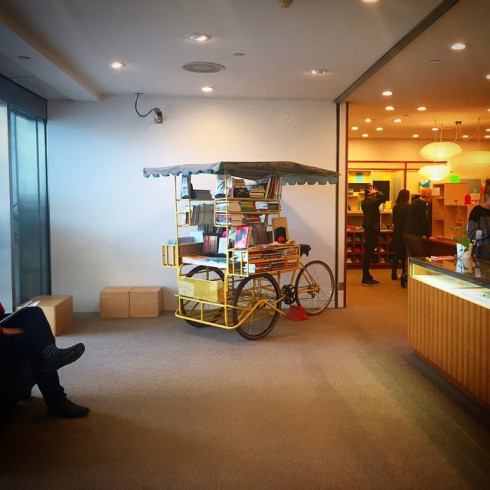
¡The AntenaMóvil is installed! Come to our bilingual event this Saturday not just to share delicious food and delicious conversation, but also to see/read/buy publications from many small and micro presses from Latin America and the U.S. — including local wonders Kaya Press, Phoneme Media, Ricochet Editions, Seite Books, and Writ Large Press. The AntenaMóvil is a retrofitted Mexican cargo trike stocked with books that are for sale and for reading on-site. The selection features bilingual and multilingual works, work in translation, and innovative texts by writers of color.
Justicia laboral alimentaria + Justicia del lenguaje: Un intercambio bilingüe
Food Labor Justice + Language Justice: A Bilingual Exchange
con / with Antena / Antena Los Ángeles, Cocina Abierta & ROC-LA
12 marzo / March 12
12pm – 3pm
Gratis / Free
Se proporcionará comida, pero si deseas, ¡trae una receta o un plato para compartir!
Food will be provided, but if you like, bring a recipe or a dish to shar e!
https://hammer.ucla.edu/antena12marzo/
Por favor RSVP / RSVP Please
(¡pero ven aunque no puedas RSVP! / ¡but come even if you can’t RSVP!)
Hammer Museum
10899 Wilshire Blvd
Los Angeles CA 90024
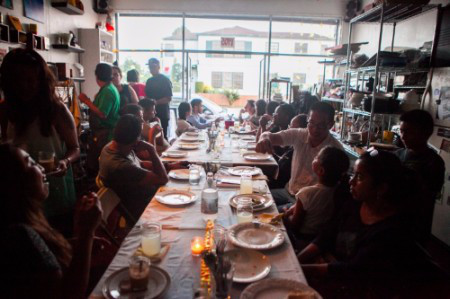
The Worker Body / El cuerpo trabajador, Cocina Abierta & ROC-LA, July 2015 / julio de 2015.
Photo/Foto: Heather M. O’Brien
Antena y Antena Los Ángeles, artistas en residencia con el programa de Public Engagement (Participación pública), junto con artistas, organizadorxs y trabajadorxs restauranterxs de la colectiva Cocina Abierta y El Centro de Oportunidades para Trabajadores de Restauranterxs de Los Ángeles (ROC-LA), invitan a lxs visitantes del Hammer a compartir comida, ideas y conversación en un espacio bilingüe. Les invitamos a escuchar las historias de trabajadorxs restauranterxs y posteriormente participar en un diálogo bilingüe durante una comida estilo familiar. Se proporcionará la comida, pero cualquier plato o receta que quieran traer será bienvenido.
¡Colabora compartiendo una receta para nuestro recetario!
Las recetas que logre recolectarse serán utilizadas por Libros Antena Books para crear una pequeña publicación DIY (Do-It-Yourself o hazlo-tú-mismx), que será distribuida a todxs lxs participantes.
Public Engagement artists-in-residence Antena and Antena Los Ángeles, along with artists, organizers and restaurant workers from the Cocina Abierta collective and Restaurant Opportunities Center of Los Angeles (ROC-LA), invite Hammer visitors to share food, ideas, and conversation in a bilingual space. Visitors are invited to hear the stories of restaurant workers and afterward engage in bilingual dialogue over a family-style meal. Food will be provided, but feel free to bring a dish or recipe to share.
Participate by contributing a recipe for our recipe book!
The collected recipes will be made into a small DIY publication by Libros Antena Books and distributed to all participants.
Jen also notes, NEWLY AVAILABLE:
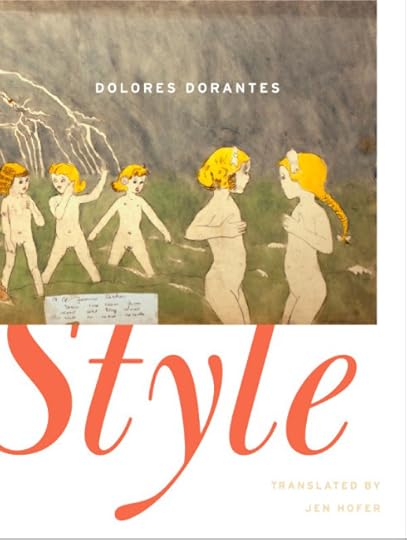
¡Ya salió la traducción de Estilo (Style) de la feroz escritora mexicana Dolores Dorantes! Puedes comprar el libro en Small Press Distribution o directo de Kenning Editions .
My translation of Estilo (Style) by the fierce Mexican writer Dolores Dorantes is out! You can by the book from Small Press Distribution or directly from Kenning Editions .


February 24, 2016
flu transmission
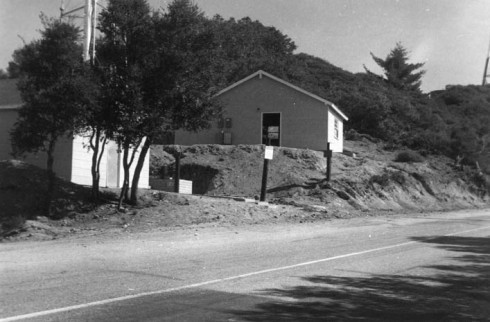
My transmitter is not broken, its unhappy, and why
Just because i have that flu
Where everything hurts, eyes hurt
From inside out
Head hurts like steel pincers, etc,
but we are alive fucking transmitter
Be happy
We are broadcasting
Live on this frequency even tho i cant keep my eyes open too long
the transmitter doesn’t care about the miracles of photosynthesis or phytoplankton
There are fish still in seas of plastic
There are children eating the crumbs and dust of buildings they used to live in
There was a couple with a little dog sitting on the neighbors steps watching the sun rise at 630 am
Immensity of the one star
Preceded by volcanic red brilliance of the sky
Over the low desert mountains, the strings of little urban lights of the san gabriel valley
All about to be silently overtaken by that major thing
Sunny new day
Still, little transmitter somehow not pleased by this vast new day
Because of the flu? Shut up and
Transmit this



February 18, 2016
Sesshu Foster Reading March 7 4PM Monday Pomona College
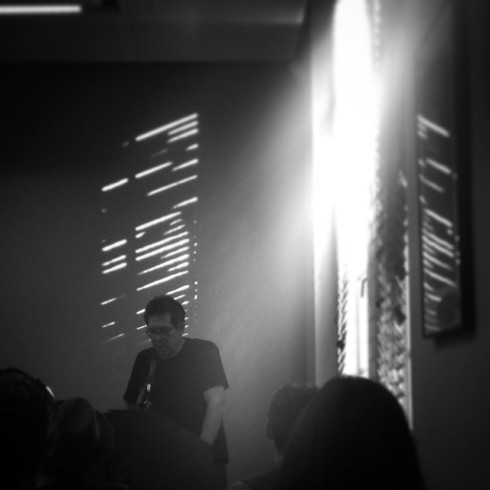
Pomona College
Ena Thompson Reading Room
140 W. Sixth Street
Acclaimed Los Angeles poet, novelist and current visiting Pomona College Creative Writing Instructor Sesshu Foster reads from his work. Sesshu won a 2010 American Book Award and a 2009 Asian American Literary Award for World Ball Notebook. His book Atomik Aztex won the 2005 Believer Book Award, and his poems have been included in several anthologies.
http://www.pomona.edu/events/reading-sesshu-foster
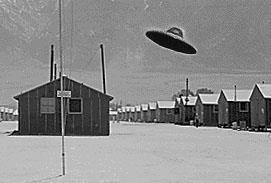


Sesshu Foster reads new and old poems
https://gorskypress.bandcamp.com/track/sesshu-foster-reads-new-and-old-poems

In front of a live audience at Book Show on October 30, 2015 in Los Angeles, CA as part of Vermin on the Mount, an irreverent reading series hosted by Jim Ruland.


February 15, 2016
Best American Experimental Writing 2015

a n annual anthology of the best new experimental writing
BAX 2015 is the second volume of an annual literary anthology compiling the best experimental writing in poetry, fiction, and creative nonfiction. This year’s volume, guest edited by Douglas Kearney, features seventy-five works by some of the most exciting American poets and writers today, including established authors—like Dodie Bellamy, Anselm Berrigan, Thomas Sayers Ellis, Cathy Park Hong, Bhanu Kapil, Aaron Kunin, Joyelle McSweeney, and Fred Moten—as well as emerging voices. Best American Experimental Writing is also an important literary anthology for classroom settings, as individual selections are intended to provoke lively conversation and debate. The series coeditors are Seth Abramson and Jesse Damiani.
Guest editor DOUGLAS KEARNEY is a poet, performer, and librettist. He is the author of Patter and The Black Automaton. He lives in Los Angeles. SETH ABRAMSON is a doctoral candidate at the University of Wisconsin–Madison and author of five books, including Thievery, winner of the Akron Poetry Prize, and Northerners, winner of the Green Rose Prize. He will be teaching at the University of New Hampshire in the fall. JESSE DAMIANI was the 2013–2014 Halls Emerging Artist Fellow at the Wisconsin Institute for Creative Writing and has received awards from the Academy of American Poets and the Fulbright Commission. He also lives in Los Angeles.
here’s a link to the issue’s digital content:
http://bax.site.wesleyan.edu/bax-2015/
blurbs:
“The permission is on every page here. The best annual experience where space is held for radical experimentation is in this book. Thanks to the editors for really keeping it real.”—CA Conrad, author of Ecodeviance
“Whether oath, tweet, conspiracy simile, or tour of Hummeltopia, this anthology swings with verve and nerve from CM Burroughs’s ‘juncture of almost’ to Roberto Harrison’s ‘contaminate network of paradise.’ The experiment lives! It exists, Lance Olsen writes, ‘the same way, say, future dictionaries exist.’”—Elizabeth Robinson, author of On Ghosts
$19.95 Paperback, 978-0-8195-7608-8
$40.00 Hardcover, 978-0-8195-7607-1
$15.99 Ebook, 978-0-8195-7609-5
Contents
• Guest Editor’s Introduction, Douglas Kearney
• Series Editors’ Introduction, Seth Abramson and Jesse Damiani
• Will Alexander, To electrify the abyss from The General Scatterings and Comment
• Steven Alvarez, tape 3
• Emily Anderson, from “Three Little Novels”
• Aaron Apps, The Formation of This Grotesque Fatty Figure
• Dodie Bellamy, Cunt Wordsworth from Cunt Norton
• Anselm Berrigan, rectangle 71
• Jeremy Blachman, Rejected Submissions to “The Complete Baby Name Wizard”
• Shane Book, Mack Daddy Manifesto
• CM Burroughs, Body as a Juncture of Almost
• Rachel Cantor, Everyone’s a Poet
• Xavier Cavazos, Sanford, Florida
• Ching-in Chen, bhanu feeds soham a concession
• Cody-Rose Clevidence, [X Y L O]
• Cecilia Corrigan, from Titanic
• Santino Dela, This is How I Will Sell More Poetry Than Any Poet in the History of the Poetry – Twitter Feed (The YOLO Pages)
• Darcie Dennigan, The Ambidextrous
• Steven Dickison, from Liberation Music Orchestra
• Kelly Dulaney, Incisor / Canine
• Andrew Durbin, from You Are My Ducati
• Thomas Sayers Ellis, Conspiracy Smile [A Poet’s Guide to the Assassination of JFK and the Assassination of Poetry]
• Bryce Emley, The Panthera tigris
• Adam Fitzgerald, “Time After Time”
• Sesshu Foster, Movie Version: “Hell to Eternity”
• C. S. Giscombe, 4 and 5 from “Early Evening”
• Renee Gladman, Number Two of the Eleven Calamities
• Maggie Glover and Isaac Pressnell, Email Exchange – Like a Flock of Tiny Birds
• Alexis Pauline Gumbs, “Black Studies” and all its children
• Elizabeth Hall, from “I Have Devoted My Life to the Clitoris: A History of Small Things”
• Brecken Hancock, The Art of Plumbing
• Duriel E. Harris, Simulacra: American Counting Rhyme
• Roberto Harrison, email personas
• Lilly Hoang and Carmen Giménez-Smith, from Hummeltopia
• Cathy Park Hong, Trouble in Mind
• Jill Jichetti, [Jill Writes . . .]
• Aisha Sasha John, I didn’t want to go so I didn’t go.
• Blair Johnson, The overlap of three translations of Kafka’s “Imperial Message” – I consider writing (a love poem)
• Janine Joseph, Between Chou and the Butterfly
• Bhanu Kapil, Monster Checklist
• Ruth Ellen Kocher, Insomnia Cycle 44
• Aaron Kunin, from “An Essay on Tickling”
• David Lau, In the Lower World’s Tiniest Grains
• Sophia Le Fraga, from I RL, YOU RL
• Sueyeun Juliette Lee, [G calls] from Juliette and the Boys
• Amy Lorraine Long, Product Warning
• Dawn Lundy Martin, Mo[dern] [Frame] or a Philosophical Treatise on What Remains between History and the Living Breathing Black Human Female
• Joyelle McSweeney, “Trial of MUSE” (from Dead Youth, or, The Leaks)
• Holly Melgard, Alienated Labor
• Tyler Mills, H-Bomb
• elena minor, rrs feed
• Nick Montfort, Through the Park
• Fred Moten, harriot + harriott + sound +
• Daniel Nadler, from The “Lacunae”
• Sunny Nagra, The Old Man and the Peach Tree
• Kelly Nelson, Inkling
• Mendi + Keith Obadike, The Wash House
• Lance Olsen, dreamlives of debris: an excerpt
• Kiki Petrosino, Doubloon Oath
• Jessy Randall, Museum Maps – Dominoes
• Jacob Reber, Deep Sea Divers and Whaleboats – Camera and Knife
• J D Scott, Cantica
• Evie Shockley, fukushima blues
• Balthazar Simões, [Dear Emiel]
• giovanni singleton, illustrated equation no. 1
• Brian Kim Stefans, from “Mediation in Steam”
• Nat Sufrin, Now, Now Rahm Emmanuel
• Vincent Toro, MicroGod Schism Song – Binary Fusion Crab Canon
• Rodrigo Toscano, from Explosion Rocks Springfield
• Tom Trudgeon, Part 2/21/6 from Study for 14 Pieces for Charles Curtis
• Sarah Vap, [13 untitled poems]
• Divya Victor, Color: A Sequence of Unbearable Happenings
• Kim Vodicka, U n i s e x O n e – S e a t e r
• Catherine Wagner, Notice
• Tyrone Williams, Coterie Chair
• Ronaldo V. Wilson, Lucy, Finally
• Steven Zultanski, from Bribery
• Aaron Apps, “You are only a part of yourself, collected in tangles”
• Matthew Burnside, In Search of: Sandbox Novel
• Alejandro Miguel Justino Crawford, Egress
• Lawrence Giffin, from Non Facit Saltus
• Tracy Gregory, For Mercy
• Tina Hyland, Google the Future
• Kaie Kellough, creole continuum – d-o-y-o-u-r-e-a-d-m-e
• Joseph Mosconi, from Demon Miso/Fashion in Child
• Dustin Luke Nelson, [Everything That Is Serious Can Have a Filter]
• Jeffrey Pethybridge, Found Poem Including History
• Acknowledgments
• Contributors
for sale at http://www.upne.com/0819576071.html
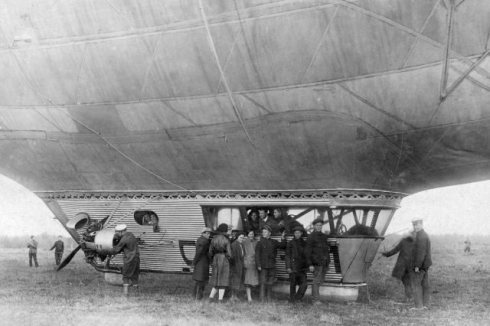


February 12, 2016
Women Writers Self-publishing
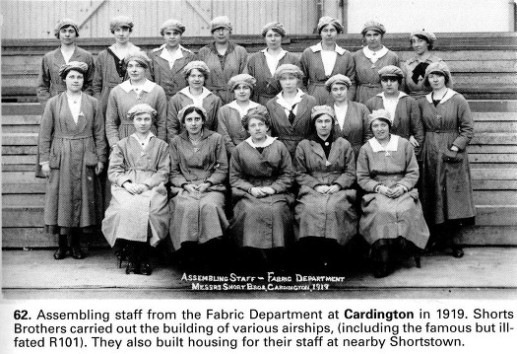
1. Meredith Wild, a self-publisher becomes a publisher:
http://www.nytimes.com/2016/01/31/business/media/meredith-wild-a-self-publisher-making-an-imprint.html?smprod=nytcore-ipad&_r=0
2. David Mamet on self-publishing:
http://www.nytimes.com/2013/04/17/business/media/david-mamet-and-other-big-authors-choose-to-self-publish.html
3. Penguin buys self-publishing company:
http://mediadecoder.blogs.nytimes.com/2012/07/19/penguin-acquires-self-publishing-company/
4. Amanda Hocking (“the darling of the self-publishing world” “the star of self-publishing” )
http://www.nytimes.com/2011/06/19/magazine/amanda-hocking-storyseller.html
5. Where the Heart Roams (“The Love Train,” and the romance novel industry in the 80s)
http://www.pbs.org/pov/wheretheheartroams/
http://www.nytimes.com/1987/08/19/movies/film-where-the-heart-roams-about-romance-novelists.html
Pull-out Pull-out quote:
'Barbara Cartland, the queen mother of the romance industry, comes on several times in
a film-stealing cameo. Mrs. Cartland (''I give women beauty and love'') is an
eye-blinding presence. Now in her mid-80's, she's always dressed in kewpie-doll
splendor (pale blue tulle, feathers of a color no bird ever grew and more jewelry than is absolutely
necessary except for one's own coronation). She has written 362 romance novels that have
sold more than 350 million copies. When she speaks, romance readers and writers pay
heed, though, apparently, they are now going their own way. “I am the best-selling
author in the world, according to the Guinness Book of Records,'' Mrs. Cartland
announces right off, holding an armful of roses and staring at the camera through
lashes dewy with makeup. She's appalled by the current trend toward more explicit
sex in romance novels. ''It's soft porn, which is really a mistake,'' she says.
How does a woman hold her man? It's perfectly simple, according to Mrs. Cartland.
''You have to make his prison, which is his home, more attractive.''
trailer:
https://www.youtube.com/watch?v=wGTLejne0pQ
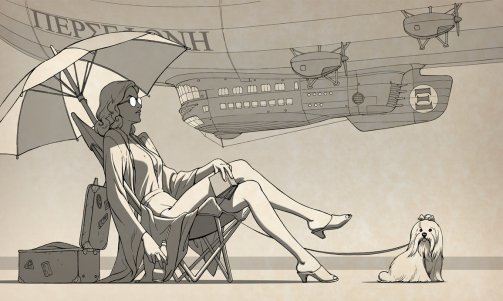
And on an entirely different (i.e., noncommercial) direction:
In the 1970s women writers influenced by the women’s movement (and their practice of
‘consciousness-raising circles’) organized writing workshops for women---organizing
“the women’s community,” including founding The Women’s Building in Los Angeles. This
building hosted literary reading series and writing workshops, mostly for women but
not exclusively, and installed and operated printing presses in the rear, publishing
letter press quality chapbooks, posters and broadsides and providing instruction for
women in printing and operating presses. As a young single mother, my friend Gloria
Alvarez organized and hosted probably the first bilingual Spanish/English women’s
writing workshop in the city at the Women’s Building.
One of the founders of The Women’s Building was writer Deena Metzger, who runs writing
workshops for women:
and Deena Metzger discusses the Women’s Building in this video:
https://www.youtube.com/watch?v=52ZvbZNnMMI
Terry Wolverton, a former director of the Women’s Building, discusses her experience
with it in her book about it:
http://www.citylights.com/book/?GCOI=87286100562870&fa=reviews
"The Woman’s Building became a North Star on a dream map for women who were looking to
redefine their lives and work. And its history—rich, splintered, groundbreaking—is the
subject of a new book." - Los Angeles Times
And Terry discusses the Women’s Building in this video:
https://www.youtube.com/watch?v=I9Ls6OhwfrM
and like Deena Metzger, Terry runs her own organization, “Writers at Work”:
http://writersatwork.com
Deena and Terry have been community leaders, organizers, and important feminists in Los
Angeles. Theirs is an older (pre-digital revolution) model of successful writers.



February 2, 2016
“On the First Socialist Tragedy,” by Andrei Platonov

INTRODUCTION TO PLATONOV
The year 1934, his thirty-fifth, was a significant watershed in the life of Andrei Platonov. He had already written The Foundation Pit and Chevengur, the novels for which he is today best known, but neither had been published in full. Soviet readers knew him mainly for a few short stories and, above all, his semi-satirical account of collectivization, ‘For Future Use’, which had been met by a storm of official criticism when it appeared in 1931. For the next three years, Platonov was unable to publish anything. But in the spring of 1934, he was included in a brigade of writers sent to Turkmenistan to report on the progress of Sovietization, and the same year was asked to contribute to a series of almanachs. Under Gorky’s general editorship, these were to celebrate the completion of the second Five-Year Plan in 1937; but they never appeared. The text reproduced here was written for one of these, titled ‘Notebooks’; it arrived on Gorky’s desk in early January 1935—a month after the assassination of Kirov, an event which unleashed a wave of purges that presaged the terror to come. Within a few days Gorky had rejected Platonov’s text as ‘unsuitable’ and ‘pessimistic’; in early March the organizing secretary of the Writers’ Union publicly denounced the unpublished article as ‘reactionary’, ‘reflecting the philosophy of elements hostile to socialism’.
The text was probably written in the first half of 1934, after Platonov’s return from Central Asia; a notebook entry from mid-April—‘dialectic of nature in the Karakum desert’—makes clear he was already considering its key themes there. Many of these relate directly to the concerns of Happy Moscow, the novel he was then writing; certain details would also be re-used in the screenplay ‘Father–Mother’ (see NLR 53). The text is, among other things, a riposte to Gorky’s own views on nature: ‘our earth is ever more generously revealing to us its countless treasures’, intoned one article from 1932. Platonov, a hydrological expert in his native Voronezh region during the droughts of the early 1920s, had an altogether different conception, combining faith in technology with knowledge of the harshness of the environment on which mankind depended. ‘On the First Socialist Tragedy’ occupies an unusual place in Platonov’s oeuvre. In generic terms, it belongs among his many journalistic writings. But those from his Voronezh period (1921–26) are more agitational in character, while his literary criticism (1937 onwards) focuses above all on aesthetic questions. Philosophical texts, as such, are very much a rarity—though it is possible more may emerge from an archive that is still, sixty years after his death, not fully catalogued. The manuscript of this text was first published in Russian in 1991; a second, typescript version appeared in 1993. The latter, which is what Gorky would have read, places much greater emphasis on the problems facing the USSR’s ‘engineers of the soul’. The translation that appears here is based on Platonov’s original manuscript—terse and prescient in equal measure.
andrei platonov
On the First Socialist Tragedy
One should keep one’s head down and not revel in life: our time is better and more serious than blissful enjoyment. Anyone who revels in it will certainly be caught and perish, like a mouse that has crawled into a mousetrap to ‘revel in’ a piece of lard on the bait pedal. Around us there is a lot of lard, but every piece is bait. One should stand with the ordinary people in their patient socialist work, and that’s all.
This mood and consciousness correspond to the way nature is constructed. Nature is not great, it is not abundant. Or it is so harshly arranged that it has never bestowed its abundance and greatness on anyone. This is a good thing, otherwise—in historical time—all of nature would have been plundered, wasted, eaten up, people would have revelled in it down to its very bones; there would always have been appetite enough. If the physical world had not had its one law—in fact, the basic law: that of the dialectic—people would have been able to destroy the world completely in a few short centuries. More: even without people, nature would have destroyed itself into pieces of its own accord. The dialectic is probably an expression of miserliness, of the daunting harshness of nature’s construction, and it is only thanks to this that the historical development of humankind became possible. Otherwise everything on earth would long since have ended, as when a child plays with sweets that have melted in his hands before he has even had time to eat them.
Where does the truth of our contemporary historical picture lie? Of course, it is a tragic picture, because the real historical work is being done not on the whole earth, but in a small part of it, with enormous overloading.
The truth, in my view, lies in the fact that ‘technology . . . decides everything’. Technology is, indeed, the subject of the contemporary historical tragedy, if by technology we understand not only the complex of man-made instruments of production, but also the organization of society, solidly founded on the technology of production, and even ideology. Ideology, incidentally, is located not in the superstructure, not ‘on high’, but within, in the middle of society’s sense of itself. To be precise, one needs to include in technology the technician himself—the person—so that one does not obtain an iron-hard understanding of the question.
The situation between technology and nature is a tragic one. The aim of technology is: ‘give me a place to stand and I will move the world’. But the construction of nature is such that it does not like to be beaten: one can move the world by taking up the lever with the required moment, but one must lose so much along the way and while the long lever is turning that, in practice, the victory is useless. This is an elementary episode of dialectics. Let us take a contemporary fact: the splitting of the atom. The same thing. The worldwide moment will arrive when, having expended a quantity of energy n on the destruction of the atom, we will obtain n + 1 as a result, and will be so happy with this wretched addition, because this absolute gain was obtained as a result of a seemingly artificial alteration of the very principle of nature; that is, the dialectic. Nature keeps itself to itself, it can only function by exchanging like for like, or even with something added in its favour; but technology strains to have it the other way around. The external world is protected from us by the dialectic. Therefore, though it seems like a paradox: the dialectic of nature is the greatest resistance to technology and the enemy of humankind. Technology is intended for and works towards the overturning or softening of the dialectic. So far it has only modestly succeeded, and so the world still cannot be kind to us.
At the same time, the dialectic alone is our sole instructor and resource against an early, senseless demise in childish enjoyment. Just as it was the force that created all technology.
In sociology, in love, in the depths of man the dialectic functions just as invariably. A man who had a ten-year-old son left him with the boy’s mother, and married a beauty. The child began to miss his father, and patiently, clumsily hanged himself. A gram of enjoyment at one end was counterbalanced by a tonne of grave soil at the other. The father removed the rope from the child’s neck and soon followed in his wake, into the grave. He wanted to revel in the innocent beauty, he wanted to bear his love not as a duty shared with one woman, but as a pleasure. Do not revel—or die.
Some naive people might object: the present crisis of production refutes such a point of view. Nothing refutes it. Imagine the highly complex armature of society in contemporary imperialism and fascism, giving off starvation and destruction for mankind in those parts, and it becomes clear at what cost the increase in productive forces was attained. Self-destruction in fascism and war between states are both losses of high-level production and vengeance for it. The tragic knot is cut without being resolved. The result is not even a tragedy in a classical sense. A world without the ussr would undoubtedly destroy itself of its own accord within the course of the next century.
The tragedy of man, armed with machinery and a heart, and with the dialectic of nature, must be resolved in our country by means of socialism. But it must be understood that this is a very serious task. The ancient life on the ‘surface’ of nature could still obtain what it needed from the waste and excretions of elemental forces and substances. But we are making our way inside the world, and in response it is pressing down upon us with equivalent force.

text from the New Left Review, 69, May/June 2011
Chevengur, a novel by Andrei Platonov:
http://monoskop.org/images/e/ed/Platonov_Andrei_Chevengur.pdf
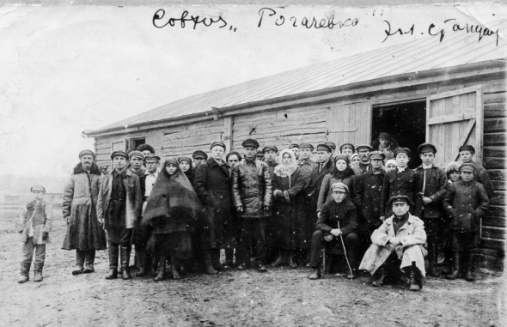
Andrei Platonov (centre, marked ‘X’) with members of the cooperative association of peasants ‘Rogachevka’ at the opening of the first power plant in the village Rogachevka, Voronezh region, 1924.
http://monoskop.org/images/e/ed/Platonov_Andrei_Chevengur.pdf


Sesshu Foster's Blog
- Sesshu Foster's profile
- 41 followers



